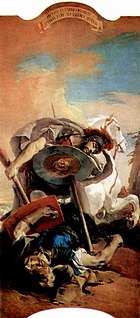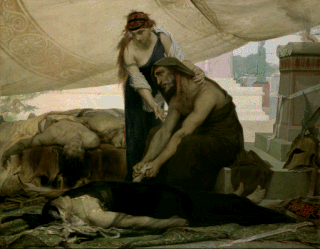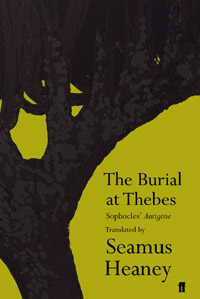
Sophocles is one of three ancient Greek tragedians whose plays have survived. His first plays were written later than, or contemporary with, those of Aeschylus; and earlier than, or contemporary with, those of Euripides. Sophocles wrote over 120 plays, but only seven have survived in a complete form: Ajax, Antigone, Women of Trachis, Oedipus Rex, Electra, Philoctetes and Oedipus at Colonus. For almost fifty years, Sophocles was the most celebrated playwright in the dramatic competitions of the city-state of Athens which took place during the religious festivals of the Lenaea and the Dionysia. He competed in thirty competitions, won twenty-four, and was never judged lower than second place. Aeschylus won thirteen competitions, and was sometimes defeated by Sophocles; Euripides won four.

In Greek mythology, Antigone is the daughter of Oedipus and either his mother Jocasta or Euryganeia. She is a sister of Polynices, Eteocles, and Ismene. The meaning of the name is, as in the case of the masculine equivalent Antigonus, "worthy of one's parents" or "in place of one's parents". She is the protagonist of the eponymous play by Sophocles.

Antigone is a tragedy by Sophocles written in or before 441 BC.
Oedipus was a mythical Greek king of Thebes. A tragic hero in Greek mythology, Oedipus accidentally fulfilled a prophecy that he would end up killing his father and marrying his mother, thereby bringing disaster to his city and family.

In Greek mythology, Eteocles was a king of Thebes, the son of Oedipus and either Jocasta or Euryganeia. The name is from earlier *Etewoklewes (Ἐτεϝοκλέϝης), meaning "truly glorious". Tawagalawas is thought to be the Hittite rendition of the name. Oedipus killed his father Laius and married his mother without knowing his relationship to either. When the relationship was revealed, he was expelled from Thebes. The rule passed to his sons Eteocles and Polynices. However, because of a curse from their father, the two brothers did not share the rule peacefully and died as a result, ultimately killing each other in battle for control of the city. Upon his death, Eteocles was succeeded by his uncle, Creon.

In Greek mythology, Polynices was the son of Oedipus and either Jocasta or Euryganeia and the older brother of Eteocles. When his father, Oedipus, was discovered to have killed his father and married his mother, he was expelled from Thebes, leaving his sons Eteocles and Polynices to rule. Because of a curse put on them by their father Oedipus, the two sons did not share the rule peacefully and died as a result, killing each other in battle for control over Thebes.
According to Sophocles' play Antigone, Haemon or Haimon was the mythological son of Creon and Eurydice, and thus brother of Menoeceus (Megareus), Lycomedes, Megara, Pyrrha and Henioche.

Creon, is a figure in Greek mythology best known as the ruler of Thebes in the legend of Oedipus.

Ismene is the name of the daughter and half-sister of Oedipus, daughter and granddaughter of Jocasta, and sister of Antigone, Eteocles, and Polynices. She appears in several plays of Sophocles: at the end of Oedipus Rex, in Oedipus at Colonus and in Antigone. She also appears at the end of Aeschylus' Seven Against Thebes.

In Greek mythology, Jocasta, also rendered Iocaste and also known as Epicaste, was a daughter of Menoeceus, a descendant of the Spartoi, and queen consort of Thebes. She was the wife of first Laius, then of their son Oedipus, and both mother and grandmother of Antigone, Eteocles, Polynices and Ismene. She was also sister of Creon and mother-in-law of Haimon.

Oedipus at Colonus is one of the three Theban plays of the Athenian tragedian Sophocles. It was written shortly before Sophocles's death in 406 BC and produced by his grandson at the Festival of Dionysus in 401 BC.

A tragic hero is the protagonist of a tragedy. In his Poetics, Aristotle records the descriptions of the tragic hero to the playwright and strictly defines the place that the tragic hero must play and the kind of man he must be. Aristotle based his observations on previous dramas. Many of the most famous instances of tragic heroes appear in Greek literature, most notably the works of Sophocles and Euripides.
The Greek Heroic Age, in mythology, is the period between the coming of the Greeks to Thessaly and the Greek return from Troy. It was demarcated as one of the five Ages of Man by Hesiod. The period spans roughly six generations; the heroes denoted by the term are superhuman, though not divine, and are celebrated in the literature of Homer.

In Greek mythology, the Seven against Thebes were seven champions who made war on Thebes. They were chosen by Adrastus, the king of Argos, to be the captains of an Argive army whose purpose was to restore Oedipus' son Polynices to the Theban throne. Adrastus, although always the leader of the expedition against Thebes, was not always counted as one of the Seven champions. Usually the Seven were: Polynices, Tydeus, Amphiaraus, Capaneus, Parthenopaeus, Hippomedon, and Adrastus or Eteoclus, whenever Adrastus is excluded. They tried and failed to take Thebes, and all but Adrastus died in the attempt.

The Phoenician Women is a tragedy by Euripides, based on the same story as Aeschylus' play Seven Against Thebes. It was presented along with the tragedies Hypsipyle and Antiope. With this trilogy, Euripides won the second prize. The title refers to the Greek chorus, which is composed of Phoenician women on their way to Delphi who are trapped in Thebes by the war. Unlike some of Euripides' other plays, the chorus does not play a significant role in the plot, but represents the innocent and neutral people who very often are found in the middle of war situations. Patriotism is a significant theme in the story, as Polynices talks a great deal about his love for the city of Thebes but has brought an army to destroy it; Creon is also forced to make a choice between saving the city and saving the life of his son.
Antigona (Antigone) is an opera in three acts in Italian by the composer Tommaso Traetta. The libretto, by Marco Coltellini, is based on the tragedy Antigone by Sophocles.
In Greek mythology, Megareus or Menoeceus (Μενοικεύς) was a warrior of Thebes, who figures in the war of the Seven against Thebes - the struggle between Eteocles and Polynices, the twin sons of Oedipus, for the throne of Thebes. He was known for his large stature, and is considered an anthropomorphic representation of his father's pride by some literary scholars.
La Thébaïde is a tragedy in five acts in verse by Jean Racine first presented, without much success, on June 20, 1664 at the Palais-Royal in Paris. The twins, along with their sister Antigone, were children borne of the incestuous marriage of the Theban king Oedipus and his mother Jocasta. The play depicts the struggle and death of the young son of Oedipus, as well as that of Antigone. This subject had already occupied many authors before Racine. Thus, the young playwright, still fairly inexperienced, drew particularly from the Antigone of Sophocles, the Phoenician Women of Euripides, but especially the Antigone of Jean Rotrou and the tragedies of Pierre Corneille.

Welcome to Thebes is a 2010 play by Moira Buffini. It premiered on 15 June 2010 in a production at the Olivier Theatre of the Royal National Theatre in London directed by Richard Eyre.

Antigone is a play by the Attic dramatist Euripides, which is now lost except for a number of fragments. According to Aristophanes of Byzantium, the plot was similar to that of Sophocles' play Antigone, with three differences. The date of the play is uncertain, but there is evidence that it was written late in Euripides' career, between 420 BCE and 406 BCE.











